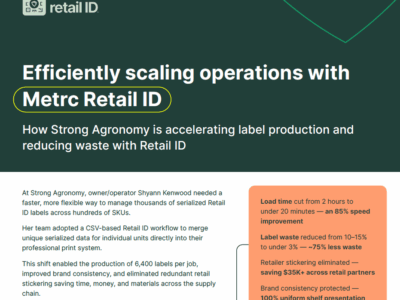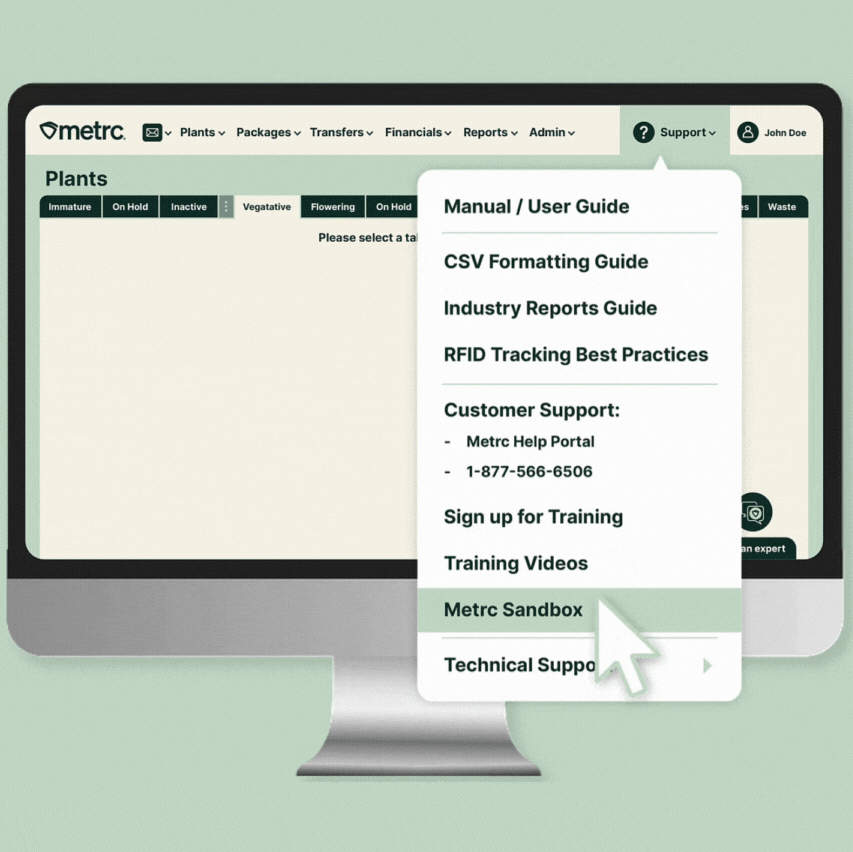Metrc’s system tracks and traces cannabis on behalf of regulatory agencies, allowing them to monitor every legal product from seed through sale. Meanwhile, many cannabis businesses utilize either a point-of-sale (POS) or enterprise resource planning (ERP) software to run their daily operations. Connecting these systems with Metrc prevents duplicate record-keeping and keeps business data and compliance data consistent. Without integration, staff might have to enter the same information twice. For example, a cultivator may record a harvest in an internal record keeping system and then again in Metrc for their compliance obligations. By enabling integrations for these business softwares with Metrc, compliance reporting becomes synchronized with normal business workflows, saving time and reducing errors.
Metrc’s Open API and Integration Network
Metrc provides an open API (application programming interface) that enables third-party software providers to connect and interact directly with the Metrc system. The API is designed to integrate with a wide range of software systems including, ERP, POS, Lab Inventory Management Systems (LIMS), banking compliance, logistics, and others to minimize manual data input tasks and help licensees remain compliant. To date, more than 500 software providers have integrated with Metrc to serve licenses of all types including retail, cultivation, testing facilities, manufacturing/processing, and distribution/transportation. This means licensees can often use off-the-shelf solutions that automatically exchange data with Metrc instead of doing uploads or data entry by hand.
Metrc continues to improve the integration experience for our partners. We introduced Metrc Connect in 2023, an upgraded API platform offering expanded features to make integrations more efficient. We also maintain a dedicated support team to assist integrators through the onboarding process. For licensees, our Validated Integrators directory lists approved POS, ERP, and other software vendors that successfully connect with Metrc’s API. Using a validated integrator can simplify operations and make sure your business systems reliably communicate with Metrc.
Integrating Metrc with Point-of-Sale (POS) Systems
In retail stores and dispensaries, integrating a POS system with Metrc can streamline sales operations, though Metrc also functions as a standalone solution for compliance and sales reporting needs. Metrc may not include everything a business may want or need for an all encompassing retail point-of-sale module, so their POS software can be connected to Metrc’s API for automatic sales and inventory reporting. Fortunately, there are many options for POS solutions today that offer built-in Metrc integration.
With an integrated POS, each transaction at the register updates your Metrc inventory records. For example, when a sale is completed, the POS system subtracts the sold items from inventory and sends the details directly to Metrc. This automation saves staff from having to re-enter sales data later and helps keep your compliance records up-to-date. Using a Metrc-connected POS can greatly reduce labor and the risk of reporting mistakes. In contrast, if your POS is not linked to Metrc, employees would need to upload sales data using spreadsheets or via manual entry through Metrc.
Integration can also improve compliance checks at the point of sale. In medical markets, if your state allows it, a POS tied into Metrc can automatically verify patient purchase limits by checking against the state’s registry before completing a sale. A direct POS-Metrc integration allows dispensaries to improve compliance outcomes in the background while staff focus on customers.
Integrating Metrc with ERP and Inventory Systems
For cultivators, manufacturers/processors, and distributors, a Metrc-integrated ERP or seed-to-sale inventory system is equally valuable. Metrc is built for facilitating compliance. While it can serve as an inventory management platform, licensees can use specialized software in addition to Metrc for cultivation tracking, manufacturing, and logistics. By linking those systems with Metrc, businesses can automate their compliance reporting for all stages of production.
Through a Metrc API integration, your internal system can send required data to the state in real time. For instance, when plants are moved to a new growth phase in a cultivation management system, that update can automatically be pushed into Metrc. Similarly, when a harvest batch package is recorded, the associated lab test results entered by the testing lab through their LIMS can be pulled from Metrc into your ERP, allowing weights, package IDs, and test outcomes to be attached to items without manual entry. This data syncing means your Metrc inventory is always kept up to date with the actual activities in your facility.
Integration with an ERP offers the benefit of a simplified process for your operations. All compliance data from Metrc, such as plant counts, transfers, sales, and more, can reside alongside your production and financial data in one system. This unified dataset can make it easier to manage the business and gain insights while meeting all reporting requirements.
Setting up an ERP integration does require planning, but Metrc’s open API and support resources help make the process manageable. Many cannabis ERP and seed-to-sale platforms are already validated to work with Metrc. Even custom-built solutions or spreadsheets can be connected using Metrc’s API keys and guidelines. Ultimately, compliance reporting can happen in the background as part of your regular workflows, rather than as a separate task.
Whether you run a dispensary, production, or testing facility, integrating your POS, ERP, or LIMS system with Metrc lets you stay compliant without adding extra work. Metrc’s integration ecosystem, from our API to our network of validated software partners, is designed to streamline data exchange and minimize human error. By automating data uploads and syncing inventory changes automatically, you can be confident that regulators receive accurate, up to date seed to sale data while your team focuses on core business operations.


